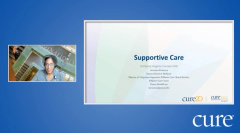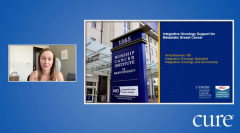
Educated Patient® Metastatic Breast Cancer Summit Supportive Care Presentation: June 11, 2022
Watch Dr. Kimberly Curseen, from Winship Cancer Institute of Emory University, discuss supportive care, during the CURE Educated Patient Metastatic Breast Cancer Summit.
Supportive care — also known as palliative care — is beneficial during any stage of the cancer process, but can be particularly helpful for patients with advanced breast cancer, explained Dr. Kimberly Curseen, director of palliative care outpatient services and associate professor at the Winship Cancer Institute of Emory University.
In a presentation at the CURE® Educated Patient® Metastatic Breast Cancer Summit, Curseen explained that supportive care focuses on managing the symptoms of cancer, as well as the social, spiritual and emotional effects that can come along with the disease.
What Is Supportive Care?
“When you enter a supportive care team, you’re going to experience an interprofessional team. So you’ll have doctors managing medications and symptoms and also providing some counseling, licensed clinical counselors and social workers help with emotional distress,” Curseen said in an interview with CURE® after her presentation. “Many supportive care teams will also have a spiritual health clinician or work closely with spiritual health clinicians to manage the spiritual distress that comes.”
To seek supportive care, patients can talk to their treatment team or hospital to determine if their practice offers the resource; go to an outpatient supportive/palliative care clinic; or seek home-based care, which is offered from certain institutions or specialists.
Research has shown that these kinds of services improve patient experience through their cancer care continuum, and Curseen has seen that to be the case firsthand.
“There are famous studies looking at advanced cancer and patient experience and improvement of quality of life when you have the extra later of supportive or palliative care, but personally, the only way I would continue to do this is if people told me that it was helpful,” Curseen said. “(It’s) the ability to have a service that flexes for them… it’s nice to be able to make things possible for people when they didn’t think it was possible…(Patients) are going to come here and get help.”
Supportive Care Is Not Just for End of Life
While supportive care can be a facet of hospice (commonly known as end-of-life care), it can be offered at any point — even if a patient does not have a poor prognosis or is undergoing curative treatment.
“Supportive or palliative care can be offered at any time during the illness, and often it’s really important when somebody is either just starting their serious illness or learning how to live with it and managing their symptoms,” Curseen said. “Treatments are tough. We don’t want you to suffer while you’re going through treatment.”
Addressing Caregiver Needs
Supportive care can also benefit patients’ loved ones, too.
At Curseen’s institution, mental health resources are extended to families and caregivers. The supportive care can also help families to navigate Family Medical Leave Act (FMLA) policies or connect them with other clinicians or spiritual support as well.
“When taking care of the patient, we also consider the caregivers, because in order for this to work, everybody in your circle needs for it to work,” Curseen said.
For more news on cancer updates, research and education, don’t forget to















